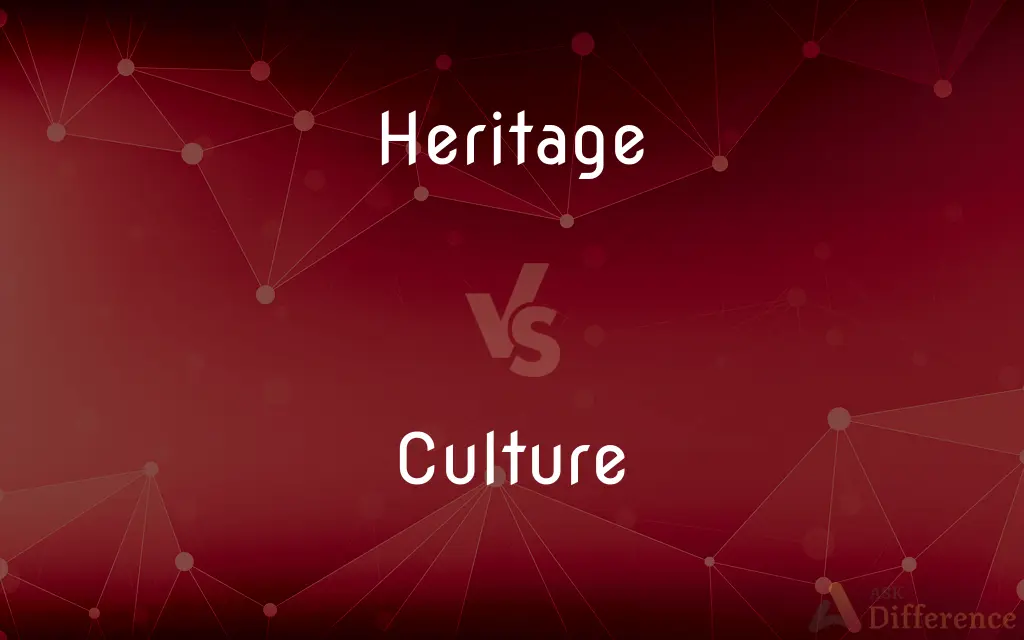Heritage vs. Culture — What's the Difference?
By Tayyaba Rehman — Updated on September 15, 2023
Heritage refers to the legacy, traditions, and artifacts passed down through generations, while culture encompasses shared beliefs, values, customs, and behaviors of a group.

Difference Between Heritage and Culture
Table of Contents
ADVERTISEMENT
Key Differences
Heritage essentially encapsulates the tangible and intangible legacies that are inherited from past generations. This includes historical buildings, artifacts, stories, and more. On the other hand, culture is broader, defining the shared beliefs, values, and practices of a specific group of people. It provides insight into how people live, what they value, and how they interpret and interact with the world.
The concept of heritage is often tied to preservation. It's about recognizing the importance of what our ancestors left behind, be it in terms of art, architecture, or intellectual achievements, and ensuring they're preserved for future generations. Culture, meanwhile, is dynamic and ever-evolving, changing with societal shifts, technological advancements, and cross-cultural interactions.
While heritage focuses on the past, connecting people with their roots and offering a historical context, culture is about the present, reflecting how people currently think, act, and live. Both play crucial roles in shaping identity. Together, heritage and culture provide a continuum, linking the past, present, and likely, the future.
Every country or community has its unique heritage, symbols and monuments that tell tales of their history. However, within that very space, there might be multiple cultures, diverse groups with their customs, festivals, and ways of life. Both enrich our world, offering insights into human civilization's vast and varied tapestry.
Comparison Chart
Definition
Legacy and traditions inherited from ancestors
Shared beliefs, values, and practices of a group
ADVERTISEMENT
Focus
Past
Present
Nature
More static, about preservation
Dynamic, constantly evolving
Examples
Monuments, artifacts, folklore
Language, customs, festivals, attire
Change Over Time
Relatively constant
Can evolve and change with time
Compare with Definitions
Heritage
Inherited assets, traditions, or values from previous generations.
The Great Wall is a significant part of China's heritage.
Culture
The attitudes and behavior characteristic of a specific group.
The startup's culture emphasized innovation and teamwork.
Heritage
Natural landscapes and biodiversity recognized for their conservation value.
The national parks are part of our natural heritage.
Culture
A particular stage of civilization.
The culture of ancient Egypt is studied for its architectural marvels.
Heritage
Legal property passed down after the death of its owner.
She received a house as part of her heritage from her grandmother.
Culture
Culture () is an umbrella term which encompasses the social behavior and norms found in human societies, as well as the knowledge, beliefs, arts, laws, customs, capabilities, and habits of the individuals in these groups.Humans acquire culture through the learning processes of enculturation and socialization, which is shown by the diversity of cultures across societies. A cultural norm codifies acceptable conduct in society; it serves as a guideline for behavior, dress, language, and demeanor in a situation, which serves as a template for expectations in a social group.
Heritage
The status acquired by birth, especially of high rank or noble ancestry.
As the daughter of a king, she had royal heritage.
Culture
The arts, beliefs, customs, institutions, and other products of human work and thought considered as a unit, especially with regard to a particular time or social group
Edwardian culture.
Japanese culture.
Heritage
Collective inheritance based on shared history or experience.
The tales of their ancestors form an essential part of their tribal heritage.
Culture
These arts, beliefs, and other products considered with respect to a particular subject or mode of expression
Musical culture.
Oral culture.
Heritage
Property that is or may be inherited; an inheritance
They had stolen his grandfather's heritage
Culture
The set of predominating attitudes and behavior that characterize a group or organization
A manager who changed the corporate culture.
Heritage
A special or individual possession; an allotted portion
God's love remains your heritage
Culture
Mental refinement and sophisticated taste resulting from the appreciation of the arts and sciences
A woman of great culture.
Heritage
Christians, or the ancient Israelites, seen as God's chosen people.
Culture
Special training and development
Voice culture for singers and actors.
Heritage
Property that is or can be inherited; an inheritance.
Culture
The cultivation of soil; tillage
The culture of the soil.
Heritage
Something that is passed down from preceding generations; a tradition.
Culture
The breeding or cultivation of animals or plants for food, the improvement of stock, or other purposes.
Heritage
The status acquired by a person through birth; a birthright
A heritage of affluence and social position.
Culture
The growing of microorganisms, tissue cells, or other living matter in a specially prepared nutrient medium.
Heritage
A domesticated animal or a crop of a traditional breed, usually not widely produced for commercial purposes.
Culture
Such a growth or colony, as of bacteria.
Heritage
An inheritance; property that may be inherited.
Culture
To cultivate (soil or plants).
Heritage
A tradition; a practice or set of values that is passed down from preceding generations through families or through institutional memory.
Culture
To grow (microorganisms or other living matter) in a specially prepared nutrient medium.
Heritage
A birthright; the status acquired by birth, especially of but not exclusive to the firstborn.
Culture
To use (a substance) as a medium for culture
Culture milk.
Heritage
(attributive) Having a certain background, such as growing up with a second language.
A heritage speaker; a heritage language
The university requires heritage Spanish students to enroll in a specially designed Spanish program not available to non-heritage students.
Culture
The arts, customs, lifestyles, background, and habits that characterize humankind, or a particular society or nation.
Heritage
That which is inherited, or passes from heir to heir; inheritance.
Part of my heritage,Which my dead father did bequeath to me.
Culture
The beliefs, values, behaviour and material objects that constitute a people's way of life.
Heritage
A possession; the Israelites, as God's chosen people; also, a flock under pastoral charge.
Culture
The conventional conducts and ideologies of a community; the system comprising the accepted norms and values of a society.
Heritage
Practices that are handed down from the past by tradition;
A heritage of freedom
Culture
(anthropology) Any knowledge passed from one generation to the next, not necessarily with respect to human beings.
Heritage
Any attribute or immaterial possession that is inherited from ancestors;
My only inheritance was my mother's blessing
The world's heritage of knowledge
Culture
(botany) Cultivation.
Heritage
That which is inherited; a title or property or estate that passes by law to the heir on the death of the owner
Culture
(microbiology) The process of growing a bacterial or other biological entity in an artificial medium.
Heritage
Hereditary succession to a title or an office or property
Culture
The growth thus produced.
I'm headed to the lab to make sure my cell culture hasn't died.
Culture
A group of bacteria.
Culture
(cartography) The details on a map that do not represent natural features of the area delineated, such as names and the symbols for towns, roads, meridians, and parallels.
Culture
(archaeology) A recurring assemblage of artifacts from a specific time and place that may constitute the material culture remains of a particular past human society.
Culture
(euphemism) Ethnicity, race (and its associated arts, customs, etc.)
Culture
(transitive) to maintain in an environment suitable for growth especially of bacteria cultivate}}
Culture
(transitive) to increase the artistic or scientific interest in something cultivate}}
Culture
The act or practice of cultivating, or of preparing the earth for seed and raising crops by tillage; as, the culture of the soil.
Culture
The act of, or any labor or means employed for, training, disciplining, or refining the moral and intellectual nature of man; as, the culture of the mind.
If vain our toilWe ought to blame the culture, not the soil.
Culture
The state of being cultivated; result of cultivation; physical improvement; enlightenment and discipline acquired by mental and moral training; civilization; refinement in manners and taste.
What the Greeks expressed by their paidei`a, the Romans by their humanitas, we less happily try to express by the more artificial word culture.
The list of all the items of the general life of a people represents that whole which we call its culture.
Culture
The cultivation of bacteria or other organisms (such as fungi or eukaryotic cells from mulitcellular organisms) in artificial media or under artificial conditions.
Culture
Those details of a map, collectively, which do not represent natural features of the area delineated, as names and the symbols for towns, roads, houses, bridges, meridians, and parallels.
Culture
To cultivate; to educate.
They came . . . into places well inhabited and cultured.
Culture
A particular society at a particular time and place;
Early Mayan civilization
Culture
The tastes in art and manners that are favored by a social group
Culture
All the knowledge and values shared by a society
Culture
(biology) the growing of microorganisms in a nutrient medium (such as gelatin or agar);
The culture of cells in a Petri dish
Culture
(bacteriology) the product of cultivating micro-organisms in a nutrient medium
Culture
A highly developed state of perfection; having a flawless or impeccable quality;
They performed with great polish
I admired the exquisite refinement of his prose
Almost an inspiration which gives to all work that finish which is almost art
Culture
The attitudes and behavior that are characteristic of a particular social group or organization;
The developing drug culture
The reason that the agency is doomed to inaction has something to do with the FBI culture
Culture
The raising of plants or animals;
The culture of oysters
Culture
The customs, arts, and social institutions of a particular group.
The Renaissance period was pivotal in shaping European culture.
Culture
The cultivation of bacteria or cells in a controlled environment.
The lab technician prepared a culture of the sample to identify the bacteria.
Culture
Intellectual and artistic activities and their products.
Opera is an essential part of Italian musical culture.
Common Curiosities
Is heritage always something tangible?
No, heritage can be both tangible, like artifacts, and intangible, like traditions.
Can two different cultures share a common heritage?
Yes, multiple cultures can trace back to a shared heritage or historical roots.
Can culture change over time?
Yes, culture is dynamic and can evolve based on societal shifts and interactions.
Is every cultural practice a part of heritage?
Not necessarily. While all heritage has cultural roots, not all current cultural practices may be considered heritage.
Are languages a part of our cultural heritage?
Yes, languages are integral to culture and are a part of a community's intangible heritage.
Why is understanding our heritage important?
Understanding heritage provides insights into our history, roots, and the foundation of our cultural practices.
Can a single country have multiple cultures?
Absolutely. Many countries are multicultural, housing diverse groups with their own customs and practices.
What roles do heritage sites play in tourism?
Heritage sites attract tourists, educating them about history and culture, and contributing to local economies.
How is heritage preserved?
Heritage can be preserved through museums, conservation efforts, documentation, and education.
How do traditions differ from culture?
Traditions are specific practices or customs passed down within a culture, while culture is a broader system of beliefs and practices.
How do art and music contribute to culture?
Art and music express and shape cultural values, emotions, and narratives, playing pivotal roles in cultural identity.
How does globalization affect culture?
Globalization can lead to cultural exchange, but also cultural homogenization, influencing local customs and traditions.
Why is cultural exchange beneficial?
Cultural exchange fosters understanding, breaks down barriers, and leads to collaborative and innovative solutions across societies.
How can individuals contribute to preserving their heritage?
Individuals can document stories, support conservation efforts, educate younger generations, and promote respect for their heritage.
Is food a representation of culture?
Yes, food reflects cultural history, geography, and traditions, often being a key cultural identifier.
Share Your Discovery

Previous Comparison
Overall vs. Whole
Next Comparison
Motor vs. GeneratorAuthor Spotlight
Written by
Tayyaba RehmanTayyaba Rehman is a distinguished writer, currently serving as a primary contributor to askdifference.com. As a researcher in semantics and etymology, Tayyaba's passion for the complexity of languages and their distinctions has found a perfect home on the platform. Tayyaba delves into the intricacies of language, distinguishing between commonly confused words and phrases, thereby providing clarity for readers worldwide.














































